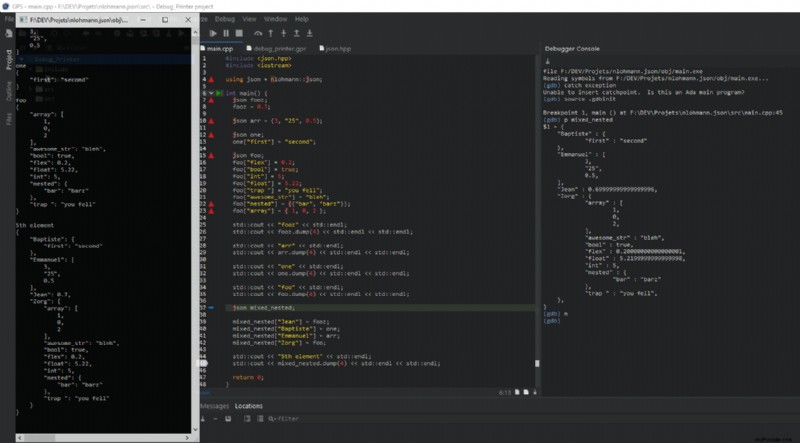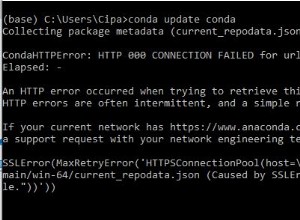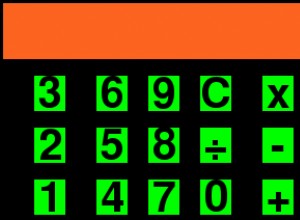J'ai trouvé ma propre réponse en lisant plus en détail les capacités de GDB et les questions de débordement de pile concernant l'impression de std ::string. Le chemin court est le plus simple. L'autre chemin était difficile, mais je suis content d'avoir réussi à le faire. Il y a beaucoup de place pour des améliorations.
- il y a un problème ouvert pour ce sujet particulier ici https://github.com/nlohmann/json/issues/1952*
Chemin court v3.1.2
J'ai simplement défini une commande gdb comme suit :
# this is a gdb script
# can be loaded from gdb using
# source my_script.txt (or. gdb or whatever you like)
define pjson
# use the lohmann's builtin dump method, ident 4 and use space separator
printf "%s\n", $arg0.dump(4, ' ', true).c_str()
end
# configure command helper (text displayed when typing 'help pjson' in gdb)
document pjson
Prints a lohmann's JSON C++ variable as a human-readable JSON string
end
Utilisation dans gdb :
(gdb) source my_custom_script.gdb
(gdb) pjson foo
{
"flex" : 0.2,
"awesome_str": "bleh",
"nested": {
"bar": "barz"
}
}
Chemin court v3.7.0 [EDIT] 2019-onv-06 On peut également utiliser la nouvelle méthode to_string(), mais je n'ai pas pu la faire fonctionner avec GDB avec un processus inférieur en direct. La méthode ci-dessous fonctionne toujours.
# this is a gdb script
# can be loaded from gdb using
# source my_script.txt (or. gdb or whatever you like)
define pjson
# use the lohmann's builtin dump method, ident 4 and use space separator
printf "%s\n", $arg0.dump(4, ' ', true, json::error_handler_t::strict).c_str()
end
# configure command helper (text displayed when typing 'help pjson' in gdb)
document pjson
Prints a lohmann's JSON C++ variable as a human-readable JSON string
end
18 avril 2020 :FONCTIONNEMENT PLEIN PYTHON GDB (avec processus inférieur en direct et symboles de débogage)
Edit 2020-avril-26 :le code (décalages) ici est hors du bleu et NON compatible pour toutes les plateformes/compilations de bibliothèques JSON. Le projet github est beaucoup plus mature sur ce sujet (3 plateformes testées à ce jour). Le code y est laissé tel quel puisque je ne maintiendrai pas 2 bases de code.
version :
- https://github.com/nlohmann/json version 3.7.3
GNU gdb (GDB) 8.3 for GNAT Community 2019 [rev=gdb-8.3-ref-194-g3fc1095]- Projet c++ créé avec
GPRBUILD/GNAT Community 2019 (20190517) (x86_64-pc-mingw32)
Le code python suivant doit être chargé dans gdb. J'utilise un fichier .gdbinit provenant de gdb.
Dépôt Github :https://github.com/LoneWanderer-GH/nlohmann-json-gdb
Script GDB
N'hésitez pas à adopter la méthode de chargement de votre choix (auto, ou non, ou plugin IDE, peu importe)
set print pretty
# source stl_parser.gdb # if you like the good work done with those STL containers GDB parsers
source printer.py # the python file is given below
python gdb.printing.register_pretty_printer(gdb.current_objfile(), build_pretty_printer())
Script Python
import gdb
import platform
import sys
import traceback
# adapted from https://github.com/hugsy/gef/blob/dev/gef.py
# their rights are theirs
HORIZONTAL_LINE = "_" # u"\u2500"
LEFT_ARROW = "<-" # "\u2190 "
RIGHT_ARROW = "->" # " \u2192 "
DOWN_ARROW = "|" # "\u21b3"
nlohmann_json_type_namespace = \
r"nlohmann::basic_json<std::map, std::vector, std::__cxx11::basic_string<char, std::char_traits<char>, " \
r"std::allocator<char> >, bool, long long, unsigned long long, double, std::allocator, nlohmann::adl_serializer>"
# STD black magic
MAGIC_STD_VECTOR_OFFSET = 16 # win 10 x64 values, beware on your platform
MAGIC_OFFSET_STD_MAP = 32 # win 10 x64 values, beware on your platform
""""""
# GDB black magic
""""""
nlohmann_json_type = gdb.lookup_type(nlohmann_json_type_namespace).pointer()
# for in memory direct jumps. cast to type is still necessary yet to obtain values, but this could be changed by chaning the types to simpler ones ?
std_rb_tree_node_type = gdb.lookup_type("std::_Rb_tree_node_base::_Base_ptr").pointer()
std_rb_tree_size_type = gdb.lookup_type("std::size_t").pointer()
""""""
# nlohmann_json reminder. any interface change should be reflected here
# enum class value_t : std::uint8_t
# {
# null, ///< null value
# object, ///< object (unordered set of name/value pairs)
# array, ///< array (ordered collection of values)
# string, ///< string value
# boolean, ///< boolean value
# number_integer, ///< number value (signed integer)
# number_unsigned, ///< number value (unsigned integer)
# number_float, ///< number value (floating-point)
# discarded ///< discarded by the the parser callback function
# };
""""""
enum_literals_namespace = ["nlohmann::detail::value_t::null",
"nlohmann::detail::value_t::object",
"nlohmann::detail::value_t::array",
"nlohmann::detail::value_t::string",
"nlohmann::detail::value_t::boolean",
"nlohmann::detail::value_t::number_integer",
"nlohmann::detail::value_t::number_unsigned",
"nlohmann::detail::value_t::number_float",
"nlohmann::detail::value_t::discarded"]
enum_literal_namespace_to_literal = dict([(e, e.split("::")[-1]) for e in enum_literals_namespace])
INDENT = 4 # beautiful isn't it ?
def std_stl_item_to_int_address(node):
return int(str(node), 0)
def parse_std_str_from_hexa_address(hexa_str):
# https://stackoverflow.com/questions/6776961/how-to-inspect-stdstring-in-gdb-with-no-source-code
return '"{}"'.format(gdb.parse_and_eval("*(char**){}".format(hexa_str)).string())
class LohmannJSONPrinter(object):
"""Print a nlohmann::json in GDB python
BEWARE :
- Contains shitty string formatting (defining lists and playing with ",".join(...) could be better; ident management is stoneage style)
- Parsing barely tested only with a live inferior process.
- It could possibly work with a core dump + debug symbols. TODO: read that stuff
https://doc.ecoscentric.com/gnutools/doc/gdb/Core-File-Generation.html
- Not idea what happens with no symbols available, lots of fields are retrieved by name and should be changed to offsets if possible
- NO LIB VERSION MANAGEMENT. TODO: determine if there are serious variants in nlohmann data structures that would justify working with strucutres
- PLATFORM DEPENDANT TODO: remove the black magic offsets or handle them in a nicer way
NB: If you are python-kaizer-style-guru, please consider helping or teaching how to improve all that mess
"""
def __init__(self, val, indent_level=0):
self.val = val
self.field_type_full_namespace = None
self.field_type_short = None
self.indent_level = indent_level
self.function_map = {"nlohmann::detail::value_t::null": self.parse_as_leaf,
"nlohmann::detail::value_t::object": self.parse_as_object,
"nlohmann::detail::value_t::array": self.parse_as_array,
"nlohmann::detail::value_t::string": self.parse_as_str,
"nlohmann::detail::value_t::boolean": self.parse_as_leaf,
"nlohmann::detail::value_t::number_integer": self.parse_as_leaf,
"nlohmann::detail::value_t::number_unsigned": self.parse_as_leaf,
"nlohmann::detail::value_t::number_float": self.parse_as_leaf,
"nlohmann::detail::value_t::discarded": self.parse_as_leaf}
def parse_as_object(self):
assert (self.field_type_short == "object")
o = self.val["m_value"][self.field_type_short]
# traversing tree is a an adapted copy pasta from STL gdb parser
# (http://www.yolinux.com/TUTORIALS/src/dbinit_stl_views-1.03.txt and similar links)
# Simple GDB Macros writen by Dan Marinescu (H-PhD) - License GPL
# Inspired by intial work of Tom Malnar,
# Tony Novac (PhD) / Cornell / Stanford,
# Gilad Mishne (PhD) and Many Many Others.
# Contact: [email protected] (Subject: STL)
#
# Modified to work with g++ 4.3 by Anders Elton
# Also added _member functions, that instead of printing the entire class in map, prints a member.
node = o["_M_t"]["_M_impl"]["_M_header"]["_M_left"]
# end = o["_M_t"]["_M_impl"]["_M_header"]
tree_size = o["_M_t"]["_M_impl"]["_M_node_count"]
# in memory alternatives:
_M_t = std_stl_item_to_int_address(o.referenced_value().address)
_M_t_M_impl_M_header_M_left = _M_t + 8 + 16 # adding bits
_M_t_M_impl_M_node_count = _M_t + 8 + 16 + 16 # adding bits
node = gdb.Value(long(_M_t_M_impl_M_header_M_left)).cast(std_rb_tree_node_type).referenced_value()
tree_size = gdb.Value(long(_M_t_M_impl_M_node_count)).cast(std_rb_tree_size_type).referenced_value()
i = 0
if tree_size == 0:
return "{}"
else:
s = "{\n"
self.indent_level += 1
while i < tree_size:
# STL GDB scripts write "+1" which in my w10 x64 GDB makes a +32 bits move ...
# may be platform dependant and should be taken with caution
key_address = std_stl_item_to_int_address(node) + MAGIC_OFFSET_STD_MAP
# print(key_object['_M_dataplus']['_M_p'])
k_str = parse_std_str_from_hexa_address(hex(key_address))
# offset = MAGIC_OFFSET_STD_MAP
value_address = key_address + MAGIC_OFFSET_STD_MAP
value_object = gdb.Value(long(value_address)).cast(nlohmann_json_type)
v_str = LohmannJSONPrinter(value_object, self.indent_level + 1).to_string()
k_v_str = "{} : {}".format(k_str, v_str)
end_of_line = "\n" if tree_size <= 1 or i == tree_size else ",\n"
s = s + (" " * (self.indent_level * INDENT)) + k_v_str + end_of_line # ",\n"
if std_stl_item_to_int_address(node["_M_right"]) != 0:
node = node["_M_right"]
while std_stl_item_to_int_address(node["_M_left"]) != 0:
node = node["_M_left"]
else:
tmp_node = node["_M_parent"]
while std_stl_item_to_int_address(node) == std_stl_item_to_int_address(tmp_node["_M_right"]):
node = tmp_node
tmp_node = tmp_node["_M_parent"]
if std_stl_item_to_int_address(node["_M_right"]) != std_stl_item_to_int_address(tmp_node):
node = tmp_node
i += 1
self.indent_level -= 2
s = s + (" " * (self.indent_level * INDENT)) + "}"
return s
def parse_as_str(self):
return parse_std_str_from_hexa_address(str(self.val["m_value"][self.field_type_short]))
def parse_as_leaf(self):
s = "WTFBBQ !"
if self.field_type_short == "null" or self.field_type_short == "discarded":
s = self.field_type_short
elif self.field_type_short == "string":
s = self.parse_as_str()
else:
s = str(self.val["m_value"][self.field_type_short])
return s
def parse_as_array(self):
assert (self.field_type_short == "array")
o = self.val["m_value"][self.field_type_short]
start = o["_M_impl"]["_M_start"]
size = o["_M_impl"]["_M_finish"] - start
# capacity = o["_M_impl"]["_M_end_of_storage"] - start
# size_max = size - 1
i = 0
start_address = std_stl_item_to_int_address(start)
if size == 0:
s = "[]"
else:
self.indent_level += 1
s = "[\n"
while i < size:
# STL GDB scripts write "+1" which in my w10 x64 GDB makes a +16 bits move ...
offset = i * MAGIC_STD_VECTOR_OFFSET
i_address = start_address + offset
value_object = gdb.Value(long(i_address)).cast(nlohmann_json_type)
v_str = LohmannJSONPrinter(value_object, self.indent_level + 1).to_string()
end_of_line = "\n" if size <= 1 or i == size else ",\n"
s = s + (" " * (self.indent_level * INDENT)) + v_str + end_of_line
i += 1
self.indent_level -= 2
s = s + (" " * (self.indent_level * INDENT)) + "]"
return s
def is_leaf(self):
return self.field_type_short != "object" and self.field_type_short != "array"
def parse_as_aggregate(self):
if self.field_type_short == "object":
s = self.parse_as_object()
elif self.field_type_short == "array":
s = self.parse_as_array()
else:
s = "WTFBBQ !"
return s
def parse(self):
# s = "WTFBBQ !"
if self.is_leaf():
s = self.parse_as_leaf()
else:
s = self.parse_as_aggregate()
return s
def to_string(self):
try:
self.field_type_full_namespace = self.val["m_type"]
str_val = str(self.field_type_full_namespace)
if not str_val in enum_literal_namespace_to_literal:
return "TIMMY !"
self.field_type_short = enum_literal_namespace_to_literal[str_val]
return self.function_map[str_val]()
# return self.parse()
except:
show_last_exception()
return "NOT A JSON OBJECT // CORRUPTED ?"
def display_hint(self):
return self.val.type
# adapted from https://github.com/hugsy/gef/blob/dev/gef.py
# inspired by https://stackoverflow.com/questions/44733195/gdb-python-api-getting-the-python-api-of-gdb-to-print-the-offending-line-numbe
def show_last_exception():
"""Display the last Python exception."""
print("")
exc_type, exc_value, exc_traceback = sys.exc_info()
print(" Exception raised ".center(80, HORIZONTAL_LINE))
print("{}: {}".format(exc_type.__name__, exc_value))
print(" Detailed stacktrace ".center(80, HORIZONTAL_LINE))
for (filename, lineno, method, code) in traceback.extract_tb(exc_traceback)[::-1]:
print("""{} File "{}", line {:d}, in {}()""".format(DOWN_ARROW, filename, lineno, method))
print(" {} {}".format(RIGHT_ARROW, code))
print(" Last 10 GDB commands ".center(80, HORIZONTAL_LINE))
gdb.execute("show commands")
print(" Runtime environment ".center(80, HORIZONTAL_LINE))
print("* GDB: {}".format(gdb.VERSION))
print("* Python: {:d}.{:d}.{:d} - {:s}".format(sys.version_info.major, sys.version_info.minor,
sys.version_info.micro, sys.version_info.releaselevel))
print("* OS: {:s} - {:s} ({:s}) on {:s}".format(platform.system(), platform.release(),
platform.architecture()[0],
" ".join(platform.dist())))
print(horizontal_line * 80)
print("")
exit(-6000)
def build_pretty_printer():
pp = gdb.printing.RegexpCollectionPrettyPrinter("nlohmann_json")
pp.add_printer(nlohmann_json_type_namespace, "^{}$".format(nlohmann_json_type_namespace), LohmannJSONPrinter)
return pp
######
# executed at autoload (or to be executed by in GDB)
# gdb.printing.register_pretty_printer(gdb.current_objfile(),build_pretty_printer())
BEWARE :
- Contains shitty string formatting (defining lists and playing with ",".join(...) could be better; ident management is stoneage style)
- Parsing barely tested only with a live inferior process.
- It could possibly work with a core dump + debug symbols. TODO: read that stuff
https://doc.ecoscentric.com/gnutools/doc/gdb/Core-File-Generation.html
- Not idea what happens with no symbols available, lots of fields are retrieved by name and should be changed to offsets if possible
- NO LIB VERSION MANAGEMENT. TODO: determine if there are serious variants in nlohmann data structures that would justify working with structures
- PLATFORM DEPENDANT TODO: remove the black magic offsets or handle them in a nicer way
NB: If you are python-kaizer-style-guru, please consider helping or teaching how to improve all that mess
certains (tests légers) :
fichier gpr :
project Debug_Printer is
for Source_Dirs use ("src", "include");
for Object_Dir use "obj";
for Main use ("main.cpp");
for Languages use ("C++");
package Naming is
for Spec_Suffix ("c++") use ".hpp";
end Naming;
package Compiler is
for Switches ("c++") use ("-O3", "-Wall", "-Woverloaded-virtual", "-g");
end Compiler;
package Linker is
for Switches ("c++") use ("-g");
end Linker;
end Debug_Printer;
main.cpp
#include // j'utilise le json.hpp autonome de la version du référentiel#include
using json = nlohmann::json;
int main() {
json fooz;
fooz = 0.7;
json arr = {3, "25", 0.5};
json one;
one["first"] = "second";
json foo;
foo["flex"] = 0.2;
foo["bool"] = true;
foo["int"] = 5;
foo["float"] = 5.22;
foo["trap "] = "you fell";
foo["awesome_str"] = "bleh";
foo["nested"] = {{"bar", "barz"}};
foo["array"] = { 1, 0, 2 };
std::cout << "fooz" << std::endl;
std::cout << fooz.dump(4) << std::endl << std::endl;
std::cout << "arr" << std::endl;
std::cout << arr.dump(4) << std::endl << std::endl;
std::cout << "one" << std::endl;
std::cout << one.dump(4) << std::endl << std::endl;
std::cout << "foo" << std::endl;
std::cout << foo.dump(4) << std::endl << std::endl;
json mixed_nested;
mixed_nested["Jean"] = fooz;
mixed_nested["Baptiste"] = one;
mixed_nested["Emmanuel"] = arr;
mixed_nested["Zorg"] = foo;
std::cout << "5th element" << std::endl;
std::cout << mixed_nested.dump(4) << std::endl << std::endl;
return 0;
}
les sorties:
(gdb) source .gdbinit
Breakpoint 1, main () at F:\DEV\Projets\nlohmann.json\src\main.cpp:45
(gdb) p mixed_nested
$1 = {
"Baptiste" : {
"first" : "second"
},
"Emmanuel" : [
3,
"25",
0.5,
],
"Jean" : 0.69999999999999996,
"Zorg" : {
"array" : [
1,
0,
2,
],
"awesome_str" : "bleh",
"bool" : true,
"flex" : 0.20000000000000001,
"float" : 5.2199999999999998,
"int" : 5,
"nested" : {
"bar" : "barz"
},
"trap " : "you fell",
},
}
Edit 2019-mars-24 :ajout d'une précision donnée par l'employé russe.
Edit 2020-april-18 :après une longue nuit de lutte avec python/gdb/stl, j'avais quelque chose qui fonctionnait par le biais de la documentation GDB pour les jolies imprimantes python. Veuillez pardonner toute erreur ou idée fausse, je me suis cogné la tête toute une nuit là-dessus et tout est flou maintenant.
Edit 2020-avril-18 (2) :le nœud d'arbre rb et tree_size pourraient être parcourus de manière plus "en mémoire" (voir ci-dessus)
Edit 2020-avril-26 :ajout d'un avertissement concernant la jolie imprimante GDB python.


